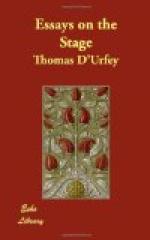We find, for many Ages past, Poets have enjoy’d this Priviledge; our Prince of Poets, Chaucer, had so much to do in this kind, that we find him weary himself, and loth to weary others with.
Of Freers I have told before,
In a making of a Crede,
And yet I cold tell worse, or more,
But Men would werien it to
read.
[Footnote: Chaucer]
This I think is pithy, but here again I think his Counsel to them is much better.
Fly fro the Prease and dwell with soothfastness,
Suffice unto thy good, tho
it be small,
For horde hath, and climbing tickleness,
Prease hath Envy, and wele
is blent ore all;
Savour no more then thee behove shall,
Rede wele thy self that other folk canst
rede,
And trouth thee shall deliver it is no
drede.
Now if he be Moral enough to take old Chaucer’s Advice I shall be glad; and so much for that subject. There is nothing now remains, before I come to vindicate Don Quixot, but a large Remark of his, upon the little or no swearing in Plays, which commonly is only a kind of an Interjection, as gad, I cod, oonz, _&c._ which I don’t defend neither, and if any others have carelesly past the Press I’m sorry for’t, for I hate them as much as he, yet because the Doctor has quoted the Statute Law against it and Players, to slander on one side, tho to reform on t’other, I will in return quote another piece of Law relating to Oaths, extreamly for his advantage, for there is only this quibbling difference between us, ’Tis a fault in us in swearing when we should not, and in him for not swearing when he should; but that now he may have occasion to say my Civilities are particular to him, I will make him do’t.
I J.C. do sincerely promise and swear, that I will be faithful, and bear true Allegiance to His Majesty King William: And I do swear that I do, from my heart, abhor, detest and abjure, as Impious and Heretical, that damnable Doctrine and Position, that Princes excommunicated, or depriv’d by the Pope, or any Authority of the See of Rome, may be Depos’d or Murther’d by their Subjects, or any other whatsoever.
And I do declare that no Foreign Prince, Person, Prelate, State or Potentate, hath, or aught to have, any Jurisdiction, Power, Superiority, Preeminence or Authority, Ecclesiastical or Spiritual, within this Realm. So help me God.
This now, with a sincerity proper, and coming to Church to hear our Divine Service, with the Prayer for the King in’t, would give one a little satisfaction as to the Doctors present opinion, for what he has been, if you will but examine and scan it by his Book, tho it be a Reforming Book, is I am sure very disputable; in one Page of it he seems very zealous for the Protestant Reformation, and says, being very much piqu’d at Sir John Brute’s putting on a Clergy-man’s Habit in the Provok’d




